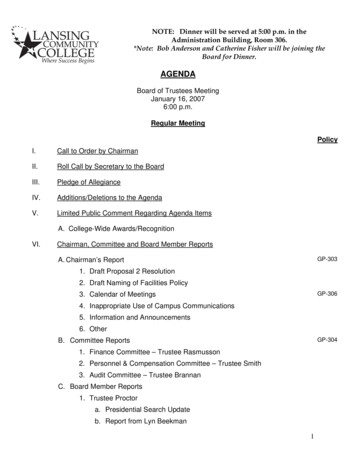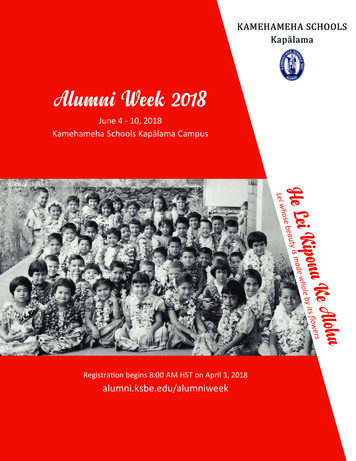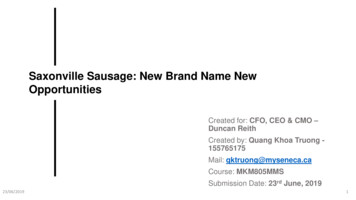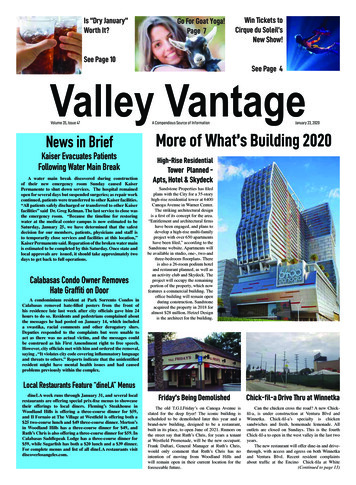
Transcription
NOTE: Dinner will be served at 5:00 p.m. in theAdministration Building, Room 306.*Note: Bob Anderson and Catherine Fisher will be joining theBoard for Dinner.AGENDABoard of Trustees MeetingJanuary 16, 20076:00 p.m.Regular MeetingPolicyI.Call to Order by ChairmanII.Roll Call by Secretary to the BoardIII.Pledge of AllegianceIV.Additions/Deletions to the AgendaV.Limited Public Comment Regarding Agenda ItemsA. College-Wide Awards/RecognitionVI.Chairman, Committee and Board Member ReportsGP-303A. Chairman’s Report1. Draft Proposal 2 Resolution2. Draft Naming of Facilities PolicyGP-3063. Calendar of Meetings4. Inappropriate Use of Campus Communications5. Information and Announcements6. OtherGP-304B. Committee Reports1. Finance Committee – Trustee Rasmusson2. Personnel & Compensation Committee – Trustee Smith3. Audit Committee – Trustee BrannanC. Board Member Reports1. Trustee Proctora. Presidential Search Updateb. Report from Lyn Beekman1
c. Workforce Development BoardVII.President’s ReportEL-206A. Informational Items1. AQIP Update2. Strategic Goals3. Strategic Communications Plan4. Human Resource Audit UpdateEL-2015. Sole Sources Purchase ReportEL-2066. Human Resources AppointmentsEL-2017. Enrollment Update8. Virtual College UpdateB. Action Items*1.2.3.4.5.6.VIII.Approval of Minutes – December 11, 2006 Regular MeetingRenaming of the Gannon Vocational Technical BuildingAlcohol Permit RequestProposed Course Fees Summer/Fall 2007Community Education Non-Standard Tuition Course PricingFinancea. Amendment to Capital Project Outlay – (Banner)b. Proposed Capital Project Outlay – (HHPS 3rd FloorRenovations)c. FY07 Budget AmendmentClosed Session*IX.Public CommentX.Board EvaluationXI.AdjournmentEL-202*Motion to accept.2
BOARD OF TRUSTEESPLANNING CALENDARNew items are in BOLDJanuary 2007Tues., Jan 16Regular Board of Trustees MeetingWed., Jan 17Men’s Basketball – 7:30 p.m./Women’s Basketball – 5:30 p.m.Grand Rapids Community CollegeLansing, MIWed., Jan 24Men’s Basketball – 7:30 p.m./Women’s Basketball – 5:30 p.m.Muskegon Community CollegeLansing, MIJan. 26 – 28LCC Performing Arts ProgramJanuary S’MovesDart Auditorium – (Fri – Sat) 7:30 p.m. & (Sun) 2:00 p.m.Sat., Jan 27Men’s Basketball – 3:00 p.m./Women’s Basketball – 1:00 p.m.Lake Michigan Community CollegeLansing, MIFebruary 2007Feb. 2 - 3MCCA Board of Directors Winter-In Service*Macomb Community CollegeWarren, MichiganWed., Feb 7Men’s Basketball – 7:30 p.m./Women’s Basketball – 5:30 p.m.Glen Oaks Community CollegeLansing, MIFeb. 9 - 10LCC Performing Arts ProgramA Village MovingDart Auditorium – 8:00 p.m.Feb. 12 - 14ACCT/AACC National Legislative Seminar*J.W. Marriott HotelWashington, D.C.Tues., Feb 13LCC Performing Arts ProgramMy Funny ValentineCreole Gallery – 7:30 p.m.(As of 4/12/06)*Please call 483-5252 for tickets or reservations no later than one week prior to event.1
1218 Turner Street, LansingWed., Feb 14Men’s Basketball – 7:30 p.m./Women’s Basketball – 5:30 p.m.Kalamazoo Valley Community CollegeLansing, MISun., Feb 18LCC Performing Arts ProgramLansing Concert BandDart Auditorium – 3:00 p.m.Mon., Feb. 19Regular Board of Trustees MeetingSat., Feb 25LCC Performing Arts ProgramLa Batterie 2007 Drum ExtravaganzaDart Auditorium – 3:00 p.m.Tues., Feb 27LCC Performing Arts ProgramLCC Jazz EnsembleDart Auditorium – 7:30 p.m.March 2007Mon., Mar 19Regular Board of Trustees MeetingApril 2007Apr. 14-17AACC ConventionTampa FloridaMon., Apr. 16Regular Board of Trustees Meeting(As of 4/12/06)*Please call 483-5252 for tickets or reservations no later than one week prior to event.2
LANSING COMMUNITY COLLEGESTATE OF MICHIGANRESOULTION ON EQUAL OPPORTUNITY AND DIVERSITY FOR ALLSTUDENTS AND EMPLOYEESA regular meeting of the Board of Trustees of Lansing Community College was held inthe Paula D. Cunningham Administration Building, 610 North Capitol Avenue, Lansing,Michigan 48933 in the Community College district, on January 16, 2007, at 6:00 o’clockp.m., prevailing Eastern Time.PRESENT:ABSENT:The following preamble and resolution were offered by Trustee andsupported by Trustee .Lansing Community College exists to serve the community and all its members.Therefore, LCC values the uniqueness of each person and is committed to creating anenvironment that supports equal opportunity for all students and employees. The U.S.Supreme Court has ruled on diversity and recognized that inequality due to race orethnicity still exists and we must continue to support the value of ensuring that everyperson in Michigan has an opportunity to better herself or himself.WHEREAS, assuring access to educational opportunity to all is a core value of ourcollege institution and community;WHEREAS, diversity in our workforce and education institutions benefits all citizens:WHEREAS, discrimination still exists;WHEREAS, on November 7, 2006, a majority of electors adopted Proposal 06-02, aproposal to amend the Michigan Constitution of 1963 to prohibit government programsthat grant preferential treatment to groups or individuals based on their race, gender,color, ethnicity or national origin for public employment, education or contractingpurposes;WHEREAS, the adoption of Proposal 06-02 may impact the programs and activities ofeducational institutions, i.e., Lansing Community College;WHEREAS, no ballot initiative can take away Lansing Community Colleges’ corevalues;WHEREAS, the college is resolved to maintain our active role in addressing theinequalities, both large and small, that plague our society and that from time to timemanifest themselves on our campus;
WHEREAS, the continued promotion of diversity at the college is a vital component inour educational efforts;NOW, THEREFORE, BE IT RESOLVED, that the Board of Trustees of LansingCommunity College, will continue to support equal opportunity and efforts to enhancecultural diversity at Lansing Community College.Ayes:Nays:Absent:RESOLUTION DECLARED ADOPTED:Secretary, Board of TrusteesLansing Community CollegeI hereby certify that the attached is a true and complete copy of a resolutionadopted by the Board of Trustees of Lansing Community College, State ofMichigan, at a regular meeting on January 16, 2007, and that public notice of saidmeeting was given pursuant to and in full compliance with Act No. 267, PublicActs of Michigan, 1976, and that minutes of the meeting were kept and will be orhave been made available as required by said Act 267.Secretary, Board of TrusteesLansing Community College
POLICY TITLE: NAMING OF FACILITIES POLICYI. PurposeThis policy serves as a guideline for the Lansing Community College Trustees,the President, the Directors of the Lansing Community College Foundation,and other staff, volunteers, and outside advisors who assist in the solicitationof gifts. It is established to assure an appropriate reflection of the history ofthe College as well as consistency, fairness, fitting recognition and good valuein exchange for the honor or privilege of name association with a program,fund, or physical aspect of the College. As gifts can encourage others to giveor do the opposite, this policy is intended only as a guide and allows forflexibility on a case-by-case basis.II. ScopeThis policy is effective as of the date of approval and will supersede all priorpolicies relating to this matter.III.GeneralPhilanthropy at Lansing Community CollegeLansing Community College (hereafter referred to as “the College”)Trustees and President, as well as the Directors of the Lansing CommunityCollege Foundation, seek private funds to enhance the College’s ability tomeet the higher education needs of its community, particularly toward alevel of excellence that would otherwise not be possible given statefunding levels and restraints on student tuition and fees. To that end, theCollege seeks to provide appropriate recognition to donors for theirgenerosity. Although such recognition may take many forms (thank youletters, press conferences, etc.), this policy seeks to establish guidelinesfor the naming of facilities, campus spaces and programs as donorrecognition.This policy is to establish the criteria to guide the process for namingfacilities at Lansing Community College.1“Failure to follow these policies may result in disciplinary action up to and including termination.”LANSING COMMUNITY COLLEGELansing Community College P.O. Box 40010 Lansing MI 48901-7210 Phone: (517) 483-1855
A.Guidelines for naming tributes1. Naming in recognition of distinguished service may honor a gift oftime or talent that has had a significant positive impact on theinstitution over an extended period of years. This honor is usuallyreserved for a College President or member of the College Boardof Trustees.a. A period of not less than one year shall lapse between the endof the individual’s service to Lansing Community College andconsideration by the Board.b. The President of the College, or a committee appointed by thePresident, is charged with determining whether the personproposed is worthy of the honor, as well as the degree ofinternal and external support for the proposed naming, priorto submitting to the Board of Trustees for approval.c. The Board will generally not name buildings for living politicalfigures or for current employees of the College.2. A significant monetary contribution to the actual constructioncost, if for new construction; a major portion of the replacementor major renovation cost, if for an existing building or facility; orthe fundraising goal.a. The donation may be made in cash or a legally binding pledgeand should be paid within five years of naming the facility,unless other arrangements are made.b. A portion of the gift may be in the form of an irrevocable trustor a contractual bequest.c. The Board reserves the right to remove names from facilitieswhen the gift remains unpaid beyond the five-year limit or theagreed upon date. Should this occur the Board may seek anaming opportunity that would be proportionate to the valueof the gift received.d. The Board requires that the following information besubmitted:1. Donor name and amount of gift.2. Current and proposed name of facility or room.2“Failure to follow these policies may result in disciplinary action up to and including termination.”LANSING COMMUNITY COLLEGELansing Community College P.O. Box 40010 Lansing MI 48901-7210 Phone: (517) 483-1855
3. Justification, including the nature and duration of theindividual’s affiliation with the College.4. If the naming is a stipulation of the gift, the request mustexplain the proposed arrangement.3. Specific contribution levels may be established with either fixed orminimum dollar amounts for sponsorship of other physicalproperty on campus.a. Such property may include, but is not limited to pavers,benches, planters, fountains, gardens, equipment, musicalinstruments, artwork, and outdoor plazas.b. Amounts for these naming opportunities shall be reviewedperiodically by the Lansing Community College Foundation andthe College Board of Trustees.B. Guidelines for naming based on monetary contributionsFacility CommemorationOpportunitiesNew BuildingExisting BuildingClassroom or LaboratoryGift Minimums and Ranges51% of cost of construction 2,000,000 minimum 50,000 to 250,000, a range ofoptions is availableEntrance hall, lobby, student lounge, 100,000 to 250,000, a range ofstaff or faculty officeoptions is availableAthletic facility (or parts of) 50,000 to 500,000, a range ofoptions is availableEndowed Chair or Faculty member 500,000Endowed Scholarship 25,000 minimumConference Room, Divisional offices or 25,000 to 100,000, a range ofdepartmentsoptions is availableOutdoor area, bench, commemorative 500 to 25,000, a range of options istree,available*This list will be reviewed for currency periodically.C. Permanency of Names1. When a gift from an individual or family is involved, a facility receives adesignation that shall last the lifetime of the facility, subject to3“Failure to follow these policies may result in disciplinary action up to and including termination.”LANSING COMMUNITY COLLEGELansing Community College P.O. Box 40010 Lansing MI 48901-7210 Phone: (517) 483-1855
paragraph 4 of this rule.a. Demolition or significant renovation shall terminate the designation.b. The individual or family involved in the initial naming may beoffered an opportunity to retain the naming before any othernaming gifts are considered.2. When a gift from a corporation is involved, the corporation shall begiven the opportunity to purchase a naming license with a namesubject to approval by the Board for a period of time to be negotiatedbetween the College and the Donor.3. When a name is to be removed from an existing facility, approval shallbe sought through the same procedures as are required for naming afacility.4. Any legal impropriety or other act which brings dishonor to the Collegeon the part of the donor or a corporate donor who is no longer inexistence shall make the gift and naming subject to reconsideration bythe College.IV. ResponsibilityA.Prior to approval, the College Board shall have reasonable assurancethat:1. The proposed name shall bring additional honor and distinction tothe College.2. Any philanthropic commitments connected with the naming shall berealized.B.The College President, upon advice and consent from the CollegeBoard of Trustees, may require that a background check is performedon a donor (living or deceased) or designee based upon particularfacts and circumstances.1. The donor, donor’s executor, or designee shall be required to signan authorization allowing the background check, if a backgroundcheck is determined to be necessary.4“Failure to follow these policies may result in disciplinary action up to and including termination.”LANSING COMMUNITY COLLEGELansing Community College P.O. Box 40010 Lansing MI 48901-7210 Phone: (517) 483-1855
C.The College President, in collaboration with the LCC Foundation hasthe right to:1. Determine content, timing, location and frequency of any publicannouncements associated with the gift.2. Approve the color, design, and size of any physical marker thatprovides information about the designee or donor and/or thenature of the gift or honor.3. Determine and carry out the exact nature of any ongoing care andmaintenance of any memorial or tribute gifts or their physicalmarkers.D.The final authority of any naming, memorial or tribute decision restswith the President and the College Board of Trustees.E.The Guidelines set forth in this policy statement shall not be deemedall-inclusive.F.The College President and/or the College Board of Trustees reservethe right to consider any and all factors regarding the privilege ofname association with the program, fund or physical aspect of LansingCommunity College as particular acts and circumstances warrant.Decisions will be made consistent with the stated mission of LansingCommunity College.5“Failure to follow these policies may result in disciplinary action up to and including termination.”LANSING COMMUNITY COLLEGELansing Community College P.O. Box 40010 Lansing MI 48901-7210 Phone: (517) 483-1855
TentativeBoard of Trustees Meeting Calendar2007 – 2008Monday, September 17, 2007Monday, October 15, 2007Monday, November 19, 2007Monday, December 10, 2007(2nd Monday due to Holiday)Organizational MeetingTuesday, January 22, 2008 (MLK Holiday on Monday)Monday, February 18, 2008Monday, March 17, 2008Monday, April 21, 2008Monday, May 19, 2008Monday, June 16, 2008
Strategic GoalsDuring the past semester, the President’s Executive Leadership Team spent significanttime on creating, reviewing, and defining five (5) new strategic goals for LansingCommunity College.After several one-day workshops to cultivate and refine these goals, the President andELT presented these five goals to members of the institution’s academic leadership, labororganizations, and other College-wide leaders for review and input.Listed below are the five strategic goals: LCC will be increasingly accessible to students, the community, and educational andbusiness partners. LCC will enhance the ability of our students to succeed in meeting their learning goals. LCC will enhance the economic vitality and quality of life of the region and state. LCC will operate as a fiscally responsible institution. LCC will embrace a culture of quality and continuous improvement to realize ourmission and vision.
Lansing Community CollegeStrategic Communication PlanJanuary 2, 2007
Executive SummaryAs it prepares to celebrate its 50th anniversary as a cornerstone of education andeconomic development in mid-Michigan, Lansing Community College seeks to enhanceits visibility in the community in a way that helps the college achieve its strategic goals.To do so, it must re-define and re-focus its communication strategies and tactics in a waythat connects to, and builds upon, the various strategic goal-setting and planninginitiatives the college has undertaken in the past 12 months.During that time, the college has faced a variety of highly visible challenges that have thepotential to affect its image in the community it serves, although its reputation as aprovider of cost-effective, career-focused educational opportunities remains sound amongstudents and potential students. To ensure that the college’s image is consistent with itssubstance and that its reputation remains intact, it has asked Lezotte Miller Osburn PublicRelations Inc. to assess current communication strategies and tactics and to recommendchanges to improve them.A careful assessment of campus-wide communication activities indicates that: The current structure of positions and functions related to communication does notsupport a strong, strategic approach to communication.Communication activities at various levels throughout the two main campuses are notgrounded in a commonly known or understood story that positions LCC mosteffectively in the community.Those in positions of leadership at all levels welcome the opportunity to influence theimage of the college through both internal and external communication activities andwould benefit from continued focus on and guidance related to communication in theupcoming year.Based on its assessment, LMO believes that a true strategic communication approachrequires that LCC simultaneously separate oversight of the communication strategies andtactics from the advancement function while integrating the core messages andresponsibility for delivering those messages throughout all communication initiativesundertaken, both centrally and at the college and departmental level. This approach willrequire: A concurrent focus on both internal and external audiences, with the internal audience“leading” initially as the college rebuilds its leadership team, works through currentchallenges, regains its focus on its mission and formulates its messages.Acknowledgement of the fact that strong communication skills and the commitmentto focusing on a common LCC story of excellence are among the core competenciesexpected of and sought among those in leadership positions at all levels of the collegehierarchy.The restructuring of key communication functions among several top-level positionsto allow for the time and resources necessary to truly undertake a strategic approachto communication.2
This plan provides details on the assessment of current communication activities as wellas recommended changes – both strategic and tactical. It includes definitions of targetaudiences and core messages, as well as recommended functions and positions to helpcarry out the plan. It is meant to be implemented internally over a 12-month period withthe appropriate oversight and approval of the president or her designate, and withappropriate external counsel as the president or her designate deem appropriate.LMO strongly recommends that the college re-assess the effectiveness of itscommunications initiatives after a 12-month period to gauge progress and effectiveness.At that time, additional recommendations can be made to help the college continue tobuild on its successes or create additional strategies to deal with new challenges.3
Table of ContentsSituation Analysis . .4Assessment . . .6Presidential communication initiatives . .6Communication among executive team members . 7General internal communication initiatives . .7Media relations . .8Communication with members of the LCC Foundation . .9Communication with the Board of Trustees 10Goals and challenges . 11Audiences, goals and messages . . 13A structure for storytelling .14Storytelling strategies and tactics . 16Providing the core LCC story to the campus . .16Integrating board and administrative communication .16Presidential communication initiatives . .17Communication among executive team leaders . 18General internal communication initiatives .18Media relations . .194
Situation AnalysisAs it prepares to celebrate its 50th anniversary, Lansing Community College is poised tore-position itself in the mid-Michigan community and among its peer institutions as acollege that understands the changing role of the community college in today’s economy– and indeed, as a college that is on the cutting edge of defining that role. As it does so,however, it is emerging from a series of divisive episodes in which members of its Boardof Trustees have been visibly critical of one another as well as publicly critical of collegeleadership and structure. The subsequent sweeping changes at the administrative levelhave placed the college in the precarious position of undertaking a search for apermanent, long-term president and building a cohesive executive leadership team toguide the college through unpredictable times while simultaneously struggling to defineitself in a positive fashion to various publics and stakeholders.In fact, in the past year the college has been in the public eye as much for controversy asfor its strong, positive role in the community. Earlier this year, LCC dominated headlinesin the Lansing State Journal and local broadcast media for weeks following theresignation of then-President Paula Cunningham and the resulting community backlash.Media also have run stories focusing on the dismissals of several executives, on softwareproblems that hampered students’ ability to receive financial aid in a timely manner andon accusations of improper accounting and management of funds. In each case, thecollege has worked meticulously to answer questions and solve problems, but somemembers of both the internal and external LCC communities remain skeptical about thefacts and about the college’s ability to stay focused on its mission.Among its peer institutions and to audiences outside mid-Michigan, the college hasestablished a positive profile in several important areas, including as a leader inalternative energy education and as a community college ahead of the curve in forgingresearch relationships with four-year institutions and corporate partners. As the lines blurbetween local, regional and national economies, these are important and appropriateachievements. However, as a pivotal partner in the Lansing region’s growth andstability, LCC must work to assure the community that the college remains focusedon the important work of educating current and future workers, of adjusting to theneeds of a changing economy and thus helping to position the Lansing region fornew economic development, job creation and continued quality of life for localresidents.Clearly, the college has a track record of such success in mid-Michigan, which still ishurting from a manufacturing downturn locally and statewide. The responsiveness of thecollege to changing employer needs in the Lansing region was an important factor, forexample, in the successful community-wide campaign to retain the confidence andinvestment of mid-Michigan’s largest employer, General Motors, when that company5
considered pulling most of its investment out of the region several years ago. The collegealso has active, vibrant programs to support small businesses and entrepreneurship in thearea, and trains the majority of health-care workers – ranging from nurses tophlebotomists – who are employed in the region.In light of its dedication both to serving the needs of the community and to broadening itsimpact throughout the region, Lansing Community College’s current president, JudithCardenas, is leading the institution through a strategic planning process to guide it intothe future. The process includes the formulation of clear, measurable goals to help defineand prioritize the work of the college. Key to the strategic planning process has been thedefinition of the core LCC story, which now must be central to the implementation ofintegrated, message-centric communication strategies and tactics that allow all employeesof the college to speak confidently and effectively about the college’s mission andaccomplishments to diverse internal and external audiences, and that reach out tostakeholders and community members in new and innovative ways.To help achieve its communication goals and to supplement the overall strategic planningprocess, Lansing Community College sought assistance from Lezotte Miller OsburnPublic Relations Inc. to develop a strategic communication plan. The plan can helpinform or be incorporated into the general strategic planning process, and can beimplemented immediately as the overall strategic planning process progresses.This strategic communication plan is designed to help LCC remain focused on the corecomponents of its mission, regain its momentum in the community and shift into highgear as it enters its next half-century. It also is designed to “build community” withinthe institution itself as the college continues its administrative transition processes.Based on an assessment of current communication initiatives and practices as well asinput from executive leaders, it outlines goals and challenges, identifies key messagesand core audiences, and provides suggested strategies, tactics and structures to effectivelyguide communication efforts as the college moves forward.6
Assessment of current initiativesLCC’s current institutional communication initiatives are based either in the Office ofInstitutional Advancement or in the Office of the President. Initiatives include bothstructured and informal communication activities for campuswide internalcommunication; media relations; communication with the Board of Trustees; andcommunication with and from the LCC Foundation. In the past six months, the coremedia relations activities have been moved to the President’s Office to allow for greateraccess to the president and top administrators on the part of the media relations staffmember, who also is charged with planning and managing special events. Formalcommunication at all levels with the Board of Trustees has been hampered by staffchanges, restructuring of administrative positions and competing workloads.Presidential communication initiativesCurrent communication initiatives from the president’s office have been undertaken for avariety of purposes, including team-building among campus leaders and as a way tointroduce the current president – whose title was recently re-cast by the board to removethe “interim” qualifier – to the campus and the community. Major initiatives include: Weekly leadership discussions: To enhance communication through all levelsof the campus community, the president holds weekly discussion meetings with theexecutive leadership team, which includes both academic and administrativerepresentatives. Each Monday meeting is devoted to one of four core topics:strategic enrollment management; planning and budgeting; Board of Trustees meetingpreparation; and operations and strategic updates. All members of the leadershipteam participate in the meetings and each can bring items to the table for discussion,although meetings are designed to cover the designated core topical issue. Onceinformation is exchanged, leadership team members can share information at theirown departmental or unit meetings as deemed appropriate. Individual meetings: Each leadership team member also meets individually withthe president once a month to discuss issues and initiatives pertinent to his or herleadership area. Team members also can submit items to the president to be includedin the president’s report to the Board of Trustees. Management memos: The president issues a monthly management memo to theexecutive leadership team. She also meets with them following Board of Trusteesmeetings to recap and discuss the potential impact of board actions.7
Board of Trustees initiatives: The President communicates frequently andregularly with the seven members of the Board of Trustees and provides writtenmaterial that is included as part of her formal report to them during their monthlymeeting. She periodically sends them various written items through heradministrative assistant or through the administrative assistant to the board. Theboard is in the process of hiring a liaison who will answer directly to the board andwhose role may include tasks related to communication between the board and thepresident’s office and the board. Designated campus site meetings: In the past year, the president has hosted aseries of “building meetings” that allowed all employees who work in each campusbuilding the opportunity to engage with her in a group discussion about issues ofgeneral interest. The meetings initially were set up to allow employees to meet thenew president and to express to her their concerns and ideas. Community meetings: The president also has participated in by-invitationcommunity meetings or
*Note: Bob Anderson and Catherine Fisher will be joining the Board for Dinner. AGENDA Board of Trustees Meeting January 16, 2007 6:00 p.m. Regular Meeting Policy I. Call to Order by Chairman II. Roll Call by Secretary to the Board III. Pledge of Allegiance IV. Additions/Deletions to the Agenda










